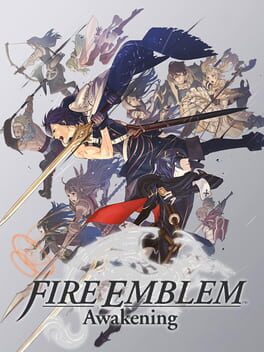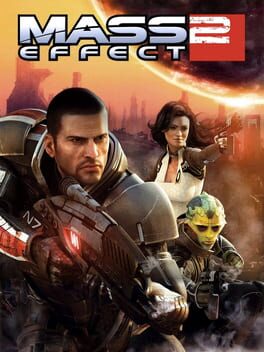EmblemadiFuoco
Bio
Nothing here!
Badges

N00b
Played 100+ games

Noticed
Gained 3+ followers

GOTY '23
Participated in the 2023 Game of the Year Event
Favorite Games
111
Total Games Played
000
Played in 2024
004
Games Backloggd
Recently Reviewed See More
Perfection in videogames is impossible. As well as it seems impossible to find a game in which there are only negative elements. In the middle of the paradox we find those kind of games whose only objective is to fight against the player, appearing as imprecise and frustrating for a narrative purpose. Games like Nier Automata or Drakengard, whose amount of endings is linked with the massive number of runs requiered to fully understand the story Yoko Taro has chosen to tell, are made in order to make people feel what some of the enemies of those stories were perceiving. Inside a medium as videogames, interactivity and storytelling moves both in the same direction. Expressions like "I would see a movie if I wanted to experience a story" doesn't work with the quoted productions, because the only way a person can really connect with the ideas of the creator, with the worldbuilding and all the iconic heroes, is playing that game, despite all the terrible and uncomfortable moments we will be forced to experience. Hellblade: Senua's Sacrifice follows this same direction, but fullfilling a different purpose.
Ninja Theory, with Hellblade, wanted to create a maximum expression of mental illness inside videogame medium. They wanted to grant us a way to comprehend what a person as Senua senses in her daily life, suffering from psychosis. We follow her journey through hell in order to save the love of her life, Dillion, with the help of the storyteller Druth while the shadows of the past of the protagonist seeks us in every moment. All this journey hides us more than what we see, because there are secrets we don't know and we notice this as soon as game mechaniques starts to repeat in a strange way, when a menancing annoucement of an hypotetical permadeath seems to never happens, when the obtainment of all the collectibles is essential to unlock a terrible secrets which changes our perspective of everything we have experienced and every character we have met. Hellblade tricks the gamer in a way not so different from what the northern myths has done to vikings. We discovers, going down inside this mad journey, that Hellblade wants to be a sort of encyclopedia of all the stories of vikings gods, ending to criticize them because they are nothing else than a way to calm fears and visions of those populations, justifing all the terrible and non-sensical acts they did, mostly for a cold search for power. Senua is a great warrior, and every fight is not so dangerous as it seems, also because she is helped by the voices she hears in her mind. At the same time what creates an unbalanced difficulty is the increasing amount of enemies and powerful figures we find, never truly defeating anyone. Because all the puzzles, all the mysterious dreams and memories we explore, every rune is nothing else than a way to escape from the past, with the final objective of making peace with it. Hellblade is an anti-game for all these reasons, but it is the strongest experience I have ever done in years of gaming.
Ninja Theory, with Hellblade, wanted to create a maximum expression of mental illness inside videogame medium. They wanted to grant us a way to comprehend what a person as Senua senses in her daily life, suffering from psychosis. We follow her journey through hell in order to save the love of her life, Dillion, with the help of the storyteller Druth while the shadows of the past of the protagonist seeks us in every moment. All this journey hides us more than what we see, because there are secrets we don't know and we notice this as soon as game mechaniques starts to repeat in a strange way, when a menancing annoucement of an hypotetical permadeath seems to never happens, when the obtainment of all the collectibles is essential to unlock a terrible secrets which changes our perspective of everything we have experienced and every character we have met. Hellblade tricks the gamer in a way not so different from what the northern myths has done to vikings. We discovers, going down inside this mad journey, that Hellblade wants to be a sort of encyclopedia of all the stories of vikings gods, ending to criticize them because they are nothing else than a way to calm fears and visions of those populations, justifing all the terrible and non-sensical acts they did, mostly for a cold search for power. Senua is a great warrior, and every fight is not so dangerous as it seems, also because she is helped by the voices she hears in her mind. At the same time what creates an unbalanced difficulty is the increasing amount of enemies and powerful figures we find, never truly defeating anyone. Because all the puzzles, all the mysterious dreams and memories we explore, every rune is nothing else than a way to escape from the past, with the final objective of making peace with it. Hellblade is an anti-game for all these reasons, but it is the strongest experience I have ever done in years of gaming.
The Forever Labyrinth is a point and click adventure with one of the best concepts you can find in videogame medium killed by a terrible technical feature. You immediately fell in love for exploring the rooms based on details in real paintings for discovering the truth behind the forever labyrinth and saving who is trapped inside, but at the same time you are constantly blocked by terrible controls and impossible interactions. In complex, it should be a great add inside the mystery genre, with the power of a Layton game or a Dan Brown novel, but it ends showing why Google should not return to videogame medium ever again.
Gameplay: 4
Game Design: 3
Technical Feature: 0,5
Narrative: 4
Protagonists: 1
Villains: 4
Multiplayer: Absent
Score and Music: 2,5
Artistic Feature: 5
Atmosphere: 2,5
Emotional Impact: 2,5
Final Verdict: ⭐⭐1/2
Gameplay: 4
Game Design: 3
Technical Feature: 0,5
Narrative: 4
Protagonists: 1
Villains: 4
Multiplayer: Absent
Score and Music: 2,5
Artistic Feature: 5
Atmosphere: 2,5
Emotional Impact: 2,5
Final Verdict: ⭐⭐1/2
Nintendo has always been a master of revenuing his fabulous brands with original ideas and innovative takes. Famous examples are represented by Animal Crossing, whose transformation into a sort of social metaverse despite his origin as life sim, The Legend of Zelda, with its sense of adventure inserted in a poetic and melancholic wild lands inspired by Studio Ghibli more than western fantasy settings, or Fire Emblem, which became a sort of mask theater tribute mixed with intrigues and wars between archetypical reigns obtaining an immense success. Obviously Super Mario Bros could not be missed in this list. After the great animated movie, a satisfying blockbuster for fans and people who grew up with the Japanese hydraulic, the other part of the franchise which broke up the entire platform genre is Super Mario Bros Wonder. Described as a revolutionary chapter of the saga, with the spectrum of a constant sense of marvel around the corner in every level. After ending it, I could certainly say that Super Mario Bros Wonder is the most mature game you can find inside this series.
Super Mario Bros Wonder tries constantly to create memorable moments granting every level a dose of replayability never seen before. The removal of the time was only the first step. In fact every level has more ways to complete it. We find mecaniques such as fake flags, verticality, interactions with the background and objects whose movement is linked with the player, without forgetting the wonder flowers and wonder seeds which modifies nature of the level with immense solutions. It is truly incredible to discover every little piece of game design, trying to make familiarity with the new powers, Elephant Mario which doesn't surprise at all, Bubble power up useful to kill in distance and the Drill one to interact directly with the scenery, and the new concept of badges, a sort of modification at gameplay inserted to grant a novelty to every try overturning the rules that were clear before. In this way lots of the new animations can be highlighted, from quotes to the movie to new ways to give emotions to the protagonists, in this sort of journey through a new world full of details. Super Mario Wonder is a pure experience. You can live it alone, enjoying the strong soundtracks and the peculiar ambiences, or connected to the entire world discovering the behavior of others in the levels and giving them help in a way very similar to the asynchronous multiplayer of Death Stranding. An experience whose search for unique memories sacrifices the precision made clear in the previous productions. Lots of flaws can be found inside the artistic feature, which eliminates completely the iconicity of the single proves Mario has to fight. Some of the most famous and traditional levels have been completely substituted to splendid representation of Wonder Flowers and Seeds which remains in our mind, but turning the levels into nothing else than containers for them. In this sense, Super Mario Bros Wonder has a deep debt with some of the newest additions to this genre, from Celeste to fan games like Mario Kaizo, without creating the kind of single challenges you could expect from this franchise. If we add to this equation some weak villains and a general atmosphere left to the adventure in complex more than the single moments, we understand how Super Mario Bros Wonder appear as something unique, fun and marvelously portrayed, the most complete game of the brand manufactured for everyone, but a title which doesn't represents the perfection.
Super Mario Bros Wonder tries to give the definitive potential of what this Nintendo platform could represent. In fact the entirety of this experience works with the strong intention of enhancing the memorable moments to sculpt them inside our brain: OST, Wonder Seeds and Flowers, new ideas in gameplay and game design and a new look of every single movement and expression. A type of grandeur which bares his side to flaws in the artistic feature and parterre of single levels and villains. What we discover in this way is that even a Mario Game can outline an epic journey, but at which cost?
Gameplay: 5
Game Design: 4
Technical Feature: 5
Narrative: 4,5
Protagonists: 5
Villains: 4
Multiplayer: 5
Score and Music: 5
Artistic Feature: 3,5
Atmosphere: 3,5
Emotional Impact: 4,5
Final Verdict: ⭐⭐⭐⭐1/2
Super Mario Bros Wonder tries constantly to create memorable moments granting every level a dose of replayability never seen before. The removal of the time was only the first step. In fact every level has more ways to complete it. We find mecaniques such as fake flags, verticality, interactions with the background and objects whose movement is linked with the player, without forgetting the wonder flowers and wonder seeds which modifies nature of the level with immense solutions. It is truly incredible to discover every little piece of game design, trying to make familiarity with the new powers, Elephant Mario which doesn't surprise at all, Bubble power up useful to kill in distance and the Drill one to interact directly with the scenery, and the new concept of badges, a sort of modification at gameplay inserted to grant a novelty to every try overturning the rules that were clear before. In this way lots of the new animations can be highlighted, from quotes to the movie to new ways to give emotions to the protagonists, in this sort of journey through a new world full of details. Super Mario Wonder is a pure experience. You can live it alone, enjoying the strong soundtracks and the peculiar ambiences, or connected to the entire world discovering the behavior of others in the levels and giving them help in a way very similar to the asynchronous multiplayer of Death Stranding. An experience whose search for unique memories sacrifices the precision made clear in the previous productions. Lots of flaws can be found inside the artistic feature, which eliminates completely the iconicity of the single proves Mario has to fight. Some of the most famous and traditional levels have been completely substituted to splendid representation of Wonder Flowers and Seeds which remains in our mind, but turning the levels into nothing else than containers for them. In this sense, Super Mario Bros Wonder has a deep debt with some of the newest additions to this genre, from Celeste to fan games like Mario Kaizo, without creating the kind of single challenges you could expect from this franchise. If we add to this equation some weak villains and a general atmosphere left to the adventure in complex more than the single moments, we understand how Super Mario Bros Wonder appear as something unique, fun and marvelously portrayed, the most complete game of the brand manufactured for everyone, but a title which doesn't represents the perfection.
Super Mario Bros Wonder tries to give the definitive potential of what this Nintendo platform could represent. In fact the entirety of this experience works with the strong intention of enhancing the memorable moments to sculpt them inside our brain: OST, Wonder Seeds and Flowers, new ideas in gameplay and game design and a new look of every single movement and expression. A type of grandeur which bares his side to flaws in the artistic feature and parterre of single levels and villains. What we discover in this way is that even a Mario Game can outline an epic journey, but at which cost?
Gameplay: 5
Game Design: 4
Technical Feature: 5
Narrative: 4,5
Protagonists: 5
Villains: 4
Multiplayer: 5
Score and Music: 5
Artistic Feature: 3,5
Atmosphere: 3,5
Emotional Impact: 4,5
Final Verdict: ⭐⭐⭐⭐1/2







